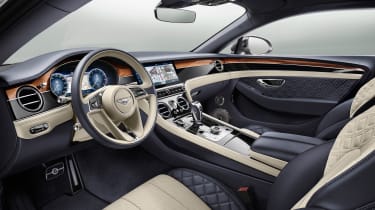2018 Bentley Continental GT – Crewe's super-coupe gets a sleek makeover
New Conti is longer, lighter and sleeker than the old car, and packed with features to surprise and delight
The second generation, British grand tourer has broken cover at the 2017 Frankfurt motor show. Stepping in for the old model after fourteen years it has been a long time coming, but certainely looks worth the wait.
In four or five decades time, long after new petrol vehicles have been consigned to the history books and remaining examples of the 2018 Bentley Continental GT are parked on lawns at the Villa d’Este and Pebble Beach, curmudgeonly old millennials will peer through its slim side glazing to glean a taste of how performance cars used to be.
> Read all our Bentley reviews here
When they do, they won’t be faced with the disappointing black mirror of a long-obsolete infotainment system, like they’d seen in the nearby McLarens and Aston Martins. Instead, they’ll see three small analogue dials; one an outside air temperature gauge, another with its needle pointing to one of the cardinal directions, and the last a stopwatch, probably unused since its first one or two owners had sat behind the wheel.
Back in 2017, the owner of a new Bentley Continental GT could choose between these dials or a (hopefully operative and up-to-date) 12.3-inch infotainment screen, rotating from one to the other (and from a third, dashboard-matching side when not in use) with the tap of a button. It’s the work of forty moving components, and tolerances between the screen and its nearby dashboard panels are less than half a millimetre.
> 2018 Rolls-Royce Phantom revealed
There’s much more to the new Continental GT than that, of course, but the attention to detail present in that single surprise-and-delight Toblerone-shaped interior component is reflected throughout the car. It’s in the beautiful crystal cut to the four distinctive Bentley headlights, it’s in the crisp pressings of the bodywork that give the new GT its distinctive haunches, and it’s in the unique diamond-pattern knurling of the traditional rotary switches used to control the heating and ventilation functions.
Stand back several paces and you can appreciate the detail Bentley has paid to the car’s entire form, too, heavily inspired by 2015’s Bentley EXP 10 Speed 6 concept. Dimensions have actually remained fairly similar to the old Continental GT, but Bentley has pushed and pulled at the car’s proportions so it’s altogether sleeker, and appears longer and wider than before. The trick has been to expand the wheelbase by 135mm, most of that forward of the front doors, to increase what director of design Stefan Sielaff describes as the ‘prestige mass’. The overhangs are shorter too and the creases in the bodywork give more definition to the styling. Is it beautiful? You can decide for yourself, but on the road, on its standard 21-inch or optional 22-inch wheels, it’ll command huge presence.
Importantly, Bentley has trimmed 85kg from the old body (a 20 per cent saving), thanks to the use of aluminium exterior panels (bootlid aside, which is composite) and clever use of high-strength steel in the structure. There’s also greater structural rigidity than before – important for refinement, as well as handling. The engine is 30kg lighter, helping to improve weight distribution to 55:45 from 58:42. With two passengers and light luggage, Bentley says that improves further to 53:47.
The W12 is a derivative of that used in the Bentayga. Built by hand, it now develops 7.5 per cent more power and a significant 25 per cent greater torque (626bhp and 664lb ft) than that of the old GT’s W12 but with greater efficiency. Low-pressure port, high-pressure direct fuel injection, twin-scroll turbochargers and a new engine management system and cylinder deactivation are the causes; 0-62mph in 3.7sec and a 207mph top speed are the remarkable effect. More remarkable still is the packaging: so tightly is everything squeezed into the engine bay that the front driveshafts pass through the sump – clearing the number six main bearing by 1.5 millimeters...
Power is sent through a new dual-clutch, eight-speed transmission. The top two gears are overdrives (top speed is achieved in sixth), while power is sent to all four wheels. Mainly the rear pair, in most conditions, with torque vectoring by braking to distribute power as required. Despite the GT focus, Bentley’s engineers say the car can be coerced into a powerslide as a result – and inevitably, there’s also a launch control function. The front cast iron brakes are a mighty 420mm in size with ten-piston calipers, with 380mm discs and four-piston calipers astern. Tyres have been co-developed with Pirelli, and feature noise-cancelling to improve refinement.
Crewe residents can blame Bentley for the state of the road outside the factory: so lousy is its surface that the company uses it to assess the ride quality of its products and has asked the local council not to resurface it. Its effects should be felt in the GT’s ride quality – three-chamber air springs suspend the body (with double-wishbones up front and a multilink rear), displacing 60 per cent more air volume than before and giving the ability to switch between chambers, to the benefit of both body control and a cosseting ride. Bentley Dynamic Ride – based around a 48-volt electrical system – can also adjust the torsion of the anti-roll bars at both ends.
That’s not to mention the new Continental GT’s myriad other features; a genuinely special-feeling and luxuriously-appointed cabin (with a less obvious smattering of VW-sourced switchgear than before), the extra luggage capacity, its digital instruments, its 92 ECUs, the slim elliptical tail lights, its 17 exterior paint shades, the optional 2200W, 18-speaker Naim sound system, and a near-endless list of other variables that will ensure few GTs will ever be alike. Production begins later this year, and we’ll have our first taste – on real roads, rather than immaculately kempt Concours lawns – soon after.









